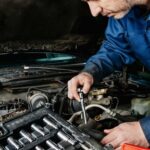It’s a common question for many car owners: what exactly does an auto body repair shop do? You might be wondering if that scratch on your car door requires a body shop or if it’s something a general mechanic handles. Understanding the difference between auto body repair and general auto repair is crucial for getting your vehicle the right service it needs.
Decoding Car Care: Body vs. Mechanical
To simplify things, think of your car in two main parts: the body and the mechanical components. The mechanical side is all about how your car runs – the engine, brakes, transmission, and everything that makes it move. The body, on the other hand, is the outer shell – the metal panels, frame, windows, and bumpers that form the car’s structure and appearance.
A typical auto repair shop focuses on the mechanical aspects, dealing with the engine and related parts that wear down or break from regular use. In contrast, auto body repair shops, often called collision centers, specialize in fixing the vehicle’s body. These are the parts that aren’t directly involved in the car’s mechanical operation but are essential for safety, aesthetics, and structural integrity.
What Services Does the Auto Body Repair Shop Offer?
Auto body repair shops, or collision centers, are your go-to for restoring the physical form of your vehicle. Their services are primarily focused on the exterior and structural components that might be damaged in accidents or through wear and tear. Here’s a closer look at what “does the auto body repair” actually means:
- Collision Repair and Restoration: This is the core of auto body repair. Whether it’s a minor fender bender or a major accident, body shops are equipped to restore vehicles to their pre-accident condition. This includes structural repairs, frame straightening, and panel replacement.
- Dent Removal and Body Work: From minor dents caused by hail or door dings to larger dents from collisions, auto body technicians are skilled in various dent removal techniques. They reshape and smooth out damaged metal panels to restore the vehicle’s original contours.
- Paint Repair and Refinishing: Auto body repair includes expert paint services. They can match factory colors precisely to repair scratches, chips, and repaint entire panels or vehicles. This involves careful preparation, application, and finishing to ensure a seamless and durable paint job.
- Bumper Repair and Replacement: Bumpers are designed to absorb impact and protect the vehicle. Auto body shops repair or replace damaged bumpers, ensuring they are structurally sound and aesthetically integrated with the vehicle’s design.
- Glass Repair and Replacement: From windshields to side and rear windows, auto body shops handle glass damage. They can repair chips and cracks or replace entire glass panels, ensuring proper sealing and safety.
- Body Panel and Component Replacement: This involves replacing damaged parts like fenders, doors, hoods, and trunk lids. Body shops ensure proper alignment and fitting of new panels to restore the vehicle’s appearance and structural integrity.
What Auto Repair Shops Handle (Mechanical Repairs)
To further clarify “does the auto body repair,” it’s helpful to understand what they don’t typically do, which falls under the realm of auto repair shops. These shops focus on the mechanical and operational aspects of your vehicle:
- Brake Service and Repair: Replacing brake pads, rotors, calipers, and lines to ensure safe stopping performance.
- Engine Repair and Maintenance: Diagnosing and fixing engine problems, performing oil changes, tune-ups, and other engine maintenance tasks.
- Transmission Repair and Service: Addressing issues with the transmission, including repairs, fluid changes, and replacements.
- Suspension and Steering Repair: Fixing issues with shocks, struts, steering components, and alignment to ensure a smooth and controlled ride.
- Electrical System Repair: Diagnosing and repairing problems with car batteries, alternators, starters, wiring, and electronic components.
- Tire Services: Tire rotation, balancing, replacement, and puncture repair.
Understanding whether you need an auto body shop or an auto repair shop depends on the nature of the problem with your vehicle. If it’s body damage, dents, or paint issues, an auto body shop is the specialist you need. If it’s a mechanical problem affecting how your car runs, then an auto repair shop is the right choice. Knowing this difference will help you seek the correct professional service and keep your car in top condition, both mechanically and aesthetically.

